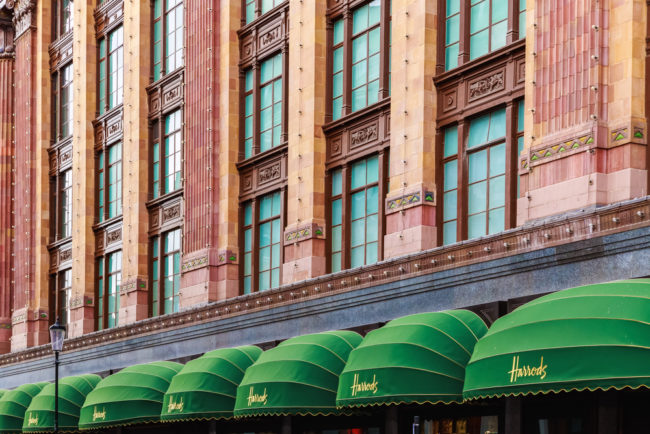The world’s most famous department store is to throw the towel in on efforts to build a sizeable presence in the UK banking market by hoisting a ‘for sale’ sign over the loss-making division, reports Sky News.
Harrods Group has been interviewing prospective advisers about handling a disposal of its banking unit, which has accumulated pre-tax losses of more than £13m during its last two financial years.
Sources said the appointment of advisers would lead to a review of options, one of which would be a sale of the business.
The move, on which Harrods declined to comment, threatens to sever well over a century of history linking the Knightsbridge-based department store and its financial services arm.
Harrods Bank was established in 1893, but was not known under its current name until the 1980s, having had a nomadic existence within the store over the course of its life.
It provides savings accounts and mortgages, as well as a range of gold bullion services aimed at its affluent customer base.
Sources said on Tuesday that Harrods Bank would be difficult to value given its track record of losses and uncertainty about whether Harrods’ Qatari owner would allow the store’s brand name to be licensed to the lender under a new owner.
According to the latest accounts filed at Companies House covering the year to January 31, 2016, Harrods Bank made a loss of £8.4m, up from £4.9m a year earlier.
It said the loss was “driven by the emphasis in 2015 on both enhancement of operational capabilities as well as building and maintaining a stable liquidity base to support future lending activities”.
Despite its huge brand awareness, Harrods Bank remains a bit-part player in the UK’s vast banking sector.
At the end of the last financial year, it had extended just under £200m of loans and advances to customers – a tiny fraction of the balance sheets of major high street lenders.
Peter Ball, the former chief executive of Harrods Bank, left last summer after two-and-a-half years in the job.
He was replaced in November by Mark Stephens, a former executive at Aldermore Bank, one of the crop of challenger banks which have floated on the London Stock Exchange since the 2008 financial crisis.
Harrods Bank’s accounts disclosed that it was “reliant on the shareholder for the provisional of additional capital”, and that the company’s owners had converted £16m of subordinated debt into equity during the course of the year.
Qatar Holding swooped for control of Harrods in 2010, buying the company from Mohamed Al Fayed for close to £1.5bn.
The main retail business has performed strongly since the takeover, with a further boost expected from the decline in sterling since last June’s EU referendum.


